What does it mean to know something? In philosophy, the study of this question is called epistemology, a field that explores truth, perception, belief, knowledge, reason, memory, and evidence.
While not a philosopher, I am an occasional pub quizzer and these concepts sound exactly like the things I think about when I'm there.
The quizmaster needs to check that the answers are true and have evidence.
The quizzer needs to use their memory and reason to work out the correct answer.
Quizzing requires a combination of what Daniel Kahneman called System 1 and System 2 thinking.
System 1 thinking is intuitive. You don't even notice you're doing it. Two plus two equals ... the answer comes without volition.
System 2 requires conscious effort. For instance, say the question was: ‘What is the sixth planet from the sun?’ To work this out, I would recall the sitcom, Third Rock from the Sun (ie where aliens come to Earth). I intuitively know that Mars is next, then vaguely remember it is Jupiter, before guessing either Saturn or Uranus. I wouldn’t be sure, though if I was really dedicated I would have learned the mnemonic: My Very Educated Mother Just Served Us Nine Pizzas.
A good quizzer will be able to access a lot of information intuitively, but a great quizzer is one who increases the speed of their System 2 thinking. There is huge satisfaction in deducing the answer to a quiz question. Knowing something intuitively feels like cheating by comparison.
It is a bad habit of mine to want everything in life to be useful. I can't just enjoy the pleasures of a quiz, I have to turn it into part of the knowledge economy. Recently, I have been wondering what it would mean if quizzes were not mere entertainment but actually made you a better thinker. Can I turn data into information, information into knowledge, and knowledge into wisdom?
When we take part in a quiz we are testing how effective we are at gathering information and accessing it at a later point. We also need the wisdom to decide whether we are going to risk points by answering a question. In my local pub quiz, there is a landmine round where one wrong answer loses you all your points for that round. And a quiz is competitive. Meritocracy is sometimes called a myth but it lives on in the pub quiz.
Although I enjoy reading Wikipedia, I would only do so out of idle curiosity. I can't imagine studying lists of Oscar winners, no matter how many times the question comes up. The random fact and the serendipitous connection are all useful for the quizzer but do they help the serious thinker? Would Nietzsche have been more insightful if he'd been down the pub every Monday night frowning at a picture round? Probably not. There is a word for most quiz facts: trivia. And trivia is trivial. We are not diminished by knowing that Gary Oldman is a couple of months younger than Gary Numan but neither is it very useful.
I wake up too early to stay out until 11.30pm doing a pub quiz during the week. I enjoyed the social aspect, but it sometimes felt like a waste of a good education. The glory of the pub quiz is the glory of the nerd who has been told they're clever their entire life but find themselves in a world that needs more than just cleverness. All the facts that they have accumulated, all the books they've read, and all the time they spent procrastinating can somehow be legitimised at the pub quiz. Or not. Despite all your academic achievements, you will probably still end up being outsmarted by three middle-aged postmen.
As with crosswords, you get better at pub quizzes by learning certain tricks. Quiz masters love quiz logic, which is where the answer to the question is usually the most interesting option. For instance, if the question is "Which is further West: Edinburgh or Bristol?" quiz logic dictates it will be the counter-intuitive answer of Edinburgh.
Over the years I've created many quiz rounds and used them as an opportunity to learn facts about the world. My favourite type of round was to look up the current day on Wikipedia and then construct questions around it.
Here is one I made a few years ago about the 14th of September, all of which are at least guessable. The answers are in the footnotes.1
On this day in 2009, Patrick Swayze died. In 1991 he was awarded People magazine's sexiest man alive title. But who is the current holder [2014]?
On this day in 1949, Fred "Sonic" Smith was born. What band did he form?
On this day in 1752, Britain adopted the Gregorian Calendar which meant that a certain number of days were lost. What was the previous day on the calendar?
On this day in 1956, footballer Ray Wilkins was born, but what is Ray Wilkins' nickname?
On this day in 1984, Lethal Bizzle was born. Last year he appeared on a celebrity Mastermind, but which US rap group did he choose as his specialist subject?
On this day in 1927, Isadora Duncan died. Her death, unfortunately, created the medical term Isadora Duncan Syndrome. What is Isadora Duncan Syndrome?
The other reason I have retired from quizzing, apart from the late finish, is because I have ascended to the televised quiz show. A few years I got chatting in the pub with the production team for Fifteen to One, which is filmed in Glasgow. I was curious about what happened and applied to be on. It was a bizarre and slightly traumatic experience but I did ok.
As a bonus to these musings on quizzing, here is a collection of picture rounds that I made for The Sparklehorse a decade ago. I don’t know if learning to identify things through pictures is useful per se, but it makes my reality richer.
The answers are in the footnotes.
Name the philosopher
Part of my interest in quizzes is how they establish canonicity. That is, if something is in a quiz then it is part of the common culture. The philosophers below are not my personal canon, but just twelve who came to mind. Who would you add?
Answers2
Name the film from the famous hand
These look iconic to me. Are they to you?
Answers3
Name the architect
Inspired to create this round by watching lots of Jonathan Meades documentaries. Creating a quiz round certainly helped me to learn more about architecture.
Answer4
Name the book from the cover
I think I searched for classic book covers and this is what came up. Tricky, unless you are a graphic design nerd or know the books very well.
Answers5
Name the mascot
I try not to eat processed food so am not sure how popular mascots are nowadays, but strongly believe that every company should have one.
Answers6
Name the Person from the Moustache
Movember spawned this monstrous round.
Answers7
Name the Body Parts
Did you pay attention in Biology? I didn’t. But knowing all the parts of the body seems extremely useful.
Answers8
1. Chris Hemsworth in 2014, Chris Evans in 2022. 2. MC5 3. September 2 4. Butch 5. Wu-Tang Clan 6. Death by having flowing garments getting trapped in machinery/wheels.
1. Slavoj Zizek 2. David Hume 3. Michel Foucault 4. Diogenes of Sinope 5. Nietzsche 6. Descartes 7. Mary Wollstonecraft 8. Ayn Rand 9. Schopenhauer 10. Wittgenstein 11. Bertrand Russell 12. Socrates
1. Pan's Labyrinth 2. Annie Hall 3. Wall-E 4. Harry Potter 5. Rocky 6. Citizen Kane 7. Psycho 8. Memento, 9. Incredible Hulk 10. The Empire Strikes Back 11. Dr No 12. Whiplash
1. Erno Goldfinger 2. John Vanbrugh 3. Le Corbusier 4. Mies van der Rohe 5. Frank Lloyd Wright 6. Norman Foster 7. Charles Rennie Mackintosh 8. Frank Gehry 9. Zaha Hadid 10. Richard Rogers 11. Albert Speer 12. Nicholas Hawksmoor
1. Wide Sargasso Sea 2. Catch-22 3. Midnight's Children 4. The Watchmen 5. Grape of Wrath 6. The Corrections 7. Mrs Dalloway 8. Gravity's Rainbow 9. Lucky Jim 10. The Prime of Miss Jean Brodie 11. Things Fall Apart 12. Lord of the Flies
1. Fido Dido from 7up 2. Tony the Tiger from Kellogs' Frosties 3. Kingsley - Partick Thistle's mascot, designed by David Shrigley 4. Chester Cheetah from Cheetos 5. Pop from team Snap, Crackle and Pop from Rice Krispies 6. Poppin Fresh AKA Pillsbury Dough Boy 7. Joe Camel from Camel Cigarettes 8. Luxo Jr. from Pixar 9. Bibendum AKA Michelin Man 10. Mr Peanut from Planters Peanuts 11. Honey Monster from Sugar Puffs 12. Cornelius the Rooster from Corn Flakes
1. Johnny Depp 2. Ron Jeremy 3. Nick Offerman 4. Errol Flynn 5. John Travolta 6. John Waters 7. Burt Reynolds 8. Gustave Flaubert 9. Richard Herring 10. Tom Selleck 11. Zac Efron 12. Daniel Day-Lewis
1. Skull (or cranium) 2. Mandible (or jawbone) 3. Clavicle (or collarbone) 4. Scapula 5. Humerus 6. Pelvis or Illium 7. Radius 8. Ulna 9. Coccyx (or tailbone) 10. Femur (or thighbone) 11. Tibia 12. Fibula













